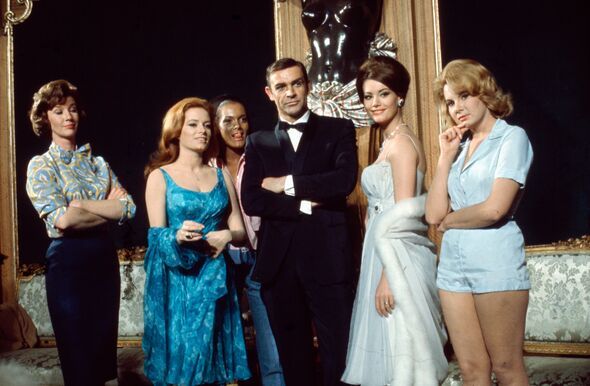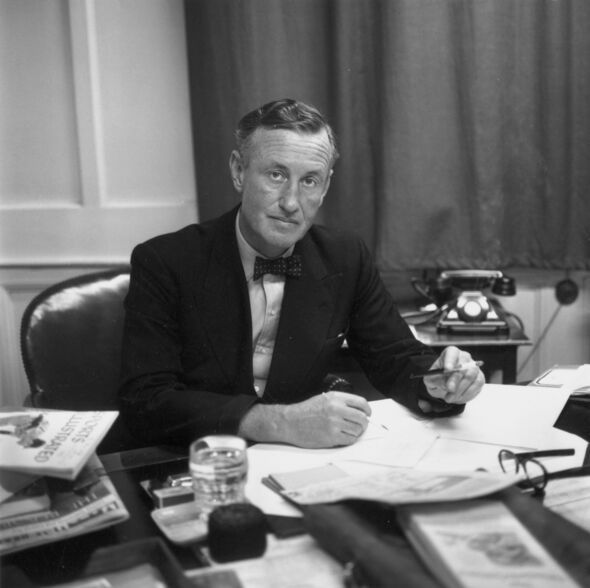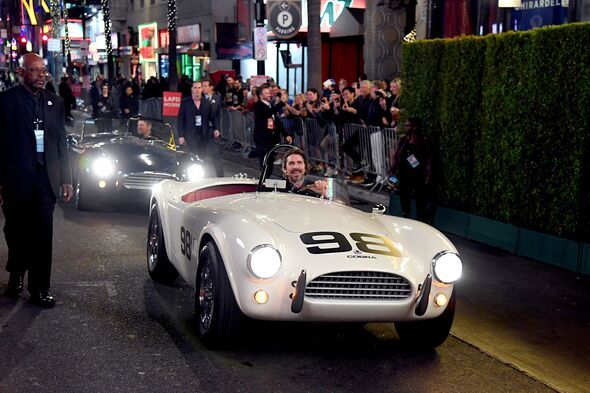

Amid arch villains bent on global domination, ruthless assassins and sultry femme fatales in James Bond's international world of espionage, you could be forgiven for not knowing the name Ernest Cuneo. There's a Las Vegas taxi driver and CIA asset with a suspiciously similar name - Ernie Cureo - who gives 007 a ride in Ian Fleming's 1956 novel Diamonds are Forever. And astute observers might have noticed that Fleming's subsequent Bond adventure Thunderball was dedicated "To Ernest Cuneo - Muse."
But in real life, Cuneo was the man who helped bring 007 into existence. "Without Ernest Cuneo there might be no James Bond," says Thomas Maier, author of the new book The Invisible Spy, which reveals Cuneo's clandestine life of intrigue and adventure as America's first spy in the Second World War, and his close friendship with Fleming. "Bond was a superspy born of Ernest Cuneo's real life wartime adventures with Ian Fleming, their witty friendship, their interest in beautiful women and nightlife, the deep wellspring of their creative imagination, and their understanding of how espionage works in a dangerous world," says the author.

"Ernest Cuneo had his hand in assassination attempts on Hitler, 'kompromat' sex traps to snare Nazi spies, and manipulated the American media while fighting Nazi conspirators in the US.
"And as Ian Fleming's friend, he helped make James Bond who we know today."
An American football star-turned-White House lawyer, Cuneo became Fleming's lifelong friend and frequent travelling companion.
Fleming credited Cuneo with the plot of Thunderball, and more than half the plot for Goldfinger. Their trip together to Las Vegas inspired Diamonds Are Forever.
The duo met early in World War Two in New York, where Cuneo served as President Franklin D Roosevelt's liaison with Winston Churchill's secret US spy operation British Security Coordination (BSC) - its agents included Fleming in British Naval Intelligence.
"Fleming and Cuneo shared a love of martinis, champagne, caviar and beautiful women - some of them spies - they wined and dined at Manhattan nightclubs," says Maier. "Cuneo was a deep state figure whose influence spread from the White House to Downing Street to the media. In many ways he was the ultimate invisible spy."
Britain's unprecedented foreign spy operation in the heart of New York City was unknown to virtually all Americans except Cuneo and President Roosevelt. The BSC aimed to keep US supply lines to Britain open, hunt down Nazi spies and collaborators, and persuade America to enter the war."
It was led by wealthy Canadian businessman and WWI flying ace William Stephenson, who cautioned Cueno: "You mustn't be afraid of murder."
With Cuneo's blessing British spies ran a "disposal squad" that saw Nazi spies in New York die "accidentally."

He even let British spies deceive President Roosevelt, feeding the White House fake German documents the British had concocted purporting to reveal Nazi plans to carve up South America. Roosevelt unknowingly sold the lie to the American public.
"The British spy operation grew to more than a thousand agents, the biggest foreign spy operation ever in the US," says Maier. "Cuneo kept all Britain's spying secrets: the plots to assassinate Hitler, and the honeytraps using sex to blackmail Nazi spies and sympathisers.
"British spy Amy Pack, codename Cynthia, uncovered top secret information through her affair with a Vichy French embassy official in Washington, DC., and secret military codes from her affair with an Italian naval officer "
But it wasn't just women spies using sex. British spy Roald Dahl, who later became a bestselling children's author, used his good looks to bed influential American women, attempting to change their views to urge the US into the war.
Maier reveals: "He became so exhausted after nights of love-making with one insatiable female target, Dahl complained to his superiors: 'It's a great assignment, but I just can't go on.' He was ordered to do his duty for England."
Cuneo was aided by prominent Britons in the US, including Charlie Chaplin, Cary Grant, Alfred Hitchcock and Noël Coward, who passed along what they heard in Hollywood as well as Washington's social circles.
"Hitler was thought to believe in the occult and used astrology in military planning, so Cuneo hired a phony astrologer to predict Hitler's death on national radio, knowing that would unnerve the Fuhrer," says the author.
And as the personal lawyer for two of America's most influential newspaper columnists - Walter Winchell and Drew Pearson - Cuneo fed them pro-British secrets and propaganda. Churchill even welcomed Cuneo at Downing Street in 1943, talking until dawn.
One of Britain's spies, attractive Canadian Margaret Watson, became Cuneo's wartime lover and eventual wife, after narrowly surviving a Nazi assassination attempt.
But it was Cuneo's wartime exploits with Fleming that helped inspire 007.
He later worked on the script for the first Bond movie, which Fleming praised as "first class" with "just the right degree of fantasy." Fleming even suggested that burly, balding Cuneo play evil mastermind Emilio Largo, because "he had a more fabulous gangster face than has ever been seen on the films." Though that script was never filmed, Fleming used much of Cuneo's material to plot Thunderball, which became the fourth Bond movie in 1965.
"For $1 Cuneo waived his rights to Thunderball," says Maier. "He was remarkably generous with his ideas."
Maier, steeped in 007's history, has his own ideas who should inherit Bond's license to kill after Daniel Craig quit the role.
"I think Michael Sheen would make a great Bond," says the author. "He's such a fine, subtle actor, with just the right blend of looks, intelligence and British charm.
"Christian Bale is incredibly talented and would be great, and Bradley Cooper could be good if you don't mind an American 007" - a prospect that is anathema to former Bond star Pierce Brosnan.
"Bond doesn't have to be a white male, either, though some fans might accuse the franchise of being too 'woke' if a woman was cast," says Maier.
The BSC closed its doors in New York in mid-1946, but Cuneo's friendship with Fleming grew stronger. The two men launched a newspaper syndicate together in the 1950s, and in 1954 went on a cross-country road trip.
"Fleming knew New York and Washington DC, but wanted to write about America and enlisted Cuneo as his guide," says Maier. "They drove across the country to Chicago and Los Angeles. In Las Vegas they stopped to gamble and drink champagne in every casino."
Fleming had purchased 12-acre beachfront estate GoldenEye in Jamaica in 1945, and there in 1952 began writing his first Bond novel, Casino Royale, inspired by his wartime espionage adventures with Cuneo and Stephenson. Fleming thought his tale a "dreadful, oafish opus," but readers thought differently.
"Cuneo was somewhat appalled by James Bond," reveals Maier. "He thought Bond rather cartoonish, sensationalising their wartime exploits, taking it to extremes. But he relished his friend's success."
Fleming dedicated Diamonds Are Forever to "ELC" - Cuneo's initials - and later wrote to his pal: "I think it is very friendly of you not to sue me over Diamonds Are Forever. Your role in the book, while respectable enough, was not as distinguished as it should have been".
Fleming rectified this by dedicating his 1963 novel Thunderball to Cuneo as his "Muse".
Hard-living Fleming had a heart attack and was limited by his doctor to 20 cigarettes and three ounces of liquor a day - advice he ignored, dying in 1964, aged 56.
Sworn to secrecy about his espionage adventures, Cuneo was frustrated that others sold their stories for fame and fortune. President Ronald Reagan was considering him for the nation's highest civilian honour, the Presidential Medal of Freedom, when Cuneo died in 1988, aged 82.
Novelist Gore Vidal called Cuneo's spying alliance with Churchill and Roosevelt one of "the largest, most intricate, and finally most successful" conspiracies of the 20th century, with Cuneo "the centre of everything,"
Maier agrees: "Without Ernest Cuneo's extraordinary spy adventures with Ian Fleming, without Cuneo's creative ideas, wise advice and savvy about the world, there would be no James Bond."
• The Invisible Spy by Thomas Maier is out now on audiobook, Hardback is released on May 8 (Hanover Square Press, £25).
